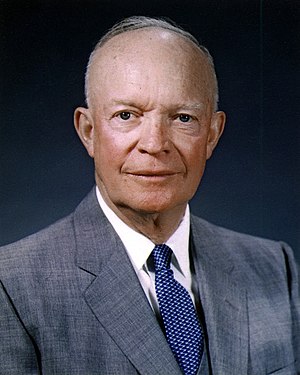Military Industrial Complex: Difference between revisions
(No difference)
| |
Latest revision as of 03:30, 5 July 2024
The expression military–industrial complex (MIC) describes the relationship between a country's military and the defense industry that supplies it, seen together as a vested interest which influences public policy. A driving factor behind the relationship between the military and the defense-minded corporations is that both sides benefit—one side from obtaining weapons, and the other from being paid to supply them. The term is most often used in reference to the system behind the armed forces of the United States, where the relationship is most prevalent due to close links among defense contractors, the Pentagon, and politicians. The expression gained popularity after a warning of the relationship's detrimental effects, in the farewell address of U.S. President Dwight D. Eisenhower on January 17, 1961.
In the context of the United States, the appellation is sometimes extended to military–industrial–congressional complex (MICC), adding the U.S. Congress to form a three-sided relationship termed an "iron triangle".Its three legs include political contributions, political approval for military spending, lobbying to support bureaucracies, and oversight of the industry; or more broadly, the entire network of contracts and flows of money and resources among individuals as well as corporations and institutions of the defense contractors, private military contractors, the Pentagon, Congress, and the executive branch. [1]
Etymology

In his farewell address, U.S. President Dwight D. Eisenhower famously warned U.S. citizens about the "military–industrial complex". U.S. President (and five-star general since World War II) Dwight D. Eisenhower used the term in his Farewell Address to the Nation on January 17, 1961:
A vital element in keeping the peace is our military establishment. Our arms must be mighty, ready for instant action, so that no potential aggressor may be tempted to risk his own destruction...
This conjunction of an immense military establishment and a large arms industry is new in the American experience. The total influence—economic, political, even spiritual—is felt in every city, every statehouse, every office of the federal government. We recognize the imperative need for this development. Yet we must not fail to comprehend its grave implications. Our toil, resources and livelihood are all involved; so is the very structure of our society. In the councils of government, we must guard against the acquisition of unwarranted influence, whether sought or unsought, by the military–industrial complex. The potential for the disastrous rise of misplaced power exists, and will persist.
We must never let the weight of this combination endanger our liberties or democratic processes. We should take nothing for granted. Only an alert and knowledgeable citizenry can compel the proper meshing of the huge industrial and military machinery of defense with our peaceful methods and goals so that security and liberty may prosper together. [emphasis added][3]
References
See Also
Militarization of Global Society

